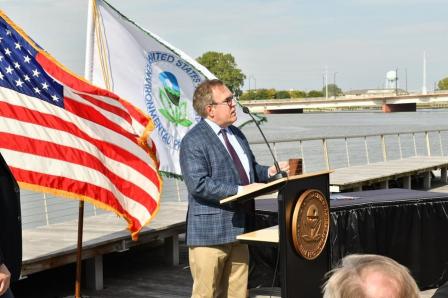We hope that today’s “IS IT TRUEâ€Â will provoke honest and open dialogue concerning issues that we, as responsible citizens of this community, need to address in a rational and responsible way?
IS IT TRUE that it is no secret that the newspaper industry has been falling on hard times for at least a decade?…from the New York Times to every daily news based paper in the country the struggle to survive has meant cuts to staff and the associated lowering the bar when it comes to quality?…it seems as though any small to medium-sized daily paper that once captured a reader’s attention for a half-hour a day is now only capable of keeping one’s attention for less than 10 minutes? …we are being told by friends in the mainstream media if the out of town conglomerate that owns the Evansville Courier and Press don’t pay strict attention to the business at hand they could be forced to publish online only? …we hope that this doesn’t happen because we also enjoy reading a printed newspaper?
IS IT TRUEÂ that the CVB board will once again hire an out of town search firm to hire a new Executive Director?
IS IT TRUE that Evansville has one of the most charismatic and hard-working Mayors in years?  …Mr. Winnecke is also very personable and likable? …we wish that he would put more focus on budgetary issues and stop going along with every capital project that comes along?  …that Mayor Winnecke has a lot of talented people surrounding him and he should start seeking their advice before he agrees to invest money on any future big-ticket capital projects?
IS IT TRUE we are told that the practice of not posting unrecorded accounts payable in a timely manner has come to an end?  …that Finra and the SEC now require cities with populations greater than 100k to submit the year-end financial report to the State Board of Accounts by using the accrual method of accounting?
IS IT TRUE we wonder if the Evansville City Controller Russ Lloyd Jr., CPA has paid the  Victory Theater bills for this year?
IS IT TRUEÂ that our elected and appointed officials are the stewards of the public trust and should start acting like it?
IS IT TRUE that the Vanderburgh County Superior Court Judge Robert J Pigmaan is doing an outstanding job for the citizens of Vanderburgh County?
IS IT TRUE when one is invited to a free lunch what do they order to drink? Â …he orders two (2) pricey double cappuccinos on the house? … it’s now been alleged that this person has done this several times before? …we bet when he pays for his own lunch he orders water?
IS IT TRUE later this week we will be announcing our guest speaker for our monthly “Working Outside The Box” series? …our that guest speaker is a highly respected member of our community? …that he hails from a well known iconic family of our community? Â …that the CEO of “Young And Established” will be telling our group about the services his organization is providing for the less than fortunate of our community?
IS IT TRUE that Evansville City Councilwoman Connie Robinson is retiring after 24 years representing the people of the 4th Ward?  …Connie is known as “Her Brothers Keeper?”  …she worked tirelessly for the citizens of the 4th Councilmatic Ward?  …she is hardworking, honest and very personable? …from time to time we respectfully disagreed with Mrs. Robinson’s political decisions?  …she always voted her conscience?  …Connie Robinson will be missed?




